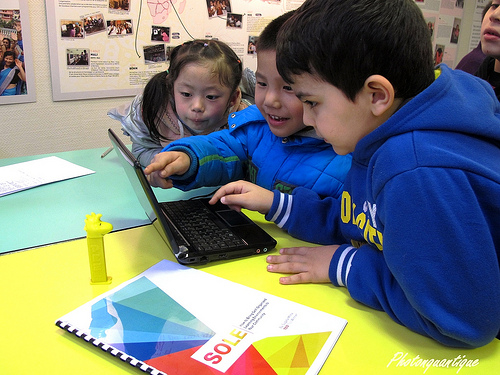
We Need More Engineers
 CEO of Intel Brian Krzanich took to the Internet last week to encourage engineering students to stick with their programs and to shed some light on the fact that America and American companies are desperate for engineers. Not just in the tech sector but in other sectors as well.
CEO of Intel Brian Krzanich took to the Internet last week to encourage engineering students to stick with their programs and to shed some light on the fact that America and American companies are desperate for engineers. Not just in the tech sector but in other sectors as well.
On my recent trip back from visiting ISG in Saudi Arabia, I sat next to an Agricultural Engineer on his way back to Seattle. He had been out for 3 weeks traveling Europe, India, and 3 countries in Africa. As he talked about his traveling adventures I couldn’t believe how much he was traveling…so I had to ask him why the company didn’t hire others. His answer:
“There aren’t any Agricultural Engineers to be had.”
That’s worrisome really…..we all need food and as our population grows we’re only going to need more. Here is someone who has dedicated his life to helping the global community produce more food for our growing population and the company can’t find anyone trained to help him out or replace him when the time comes…he’s hoping to retire in 5 years.
Forbes predicts that there were 1.7 million Cloud-Based Technology jobs that went unfilled globally in 2012 and the outlook and predictions moving forward aren’t any better. So this isn’t just an American problem….it’s a global one.
At a K-12 level what are we doing to prepare students for these jobs? We can’t force students to be engineers but are we giving them the experiences they need in K-12 to even be in a place to think about engineering as a career?
Kalyani Mallela, 29, said engineering is a foundation applicable to all industries and fields, enabling people to do anything from build chips and wearable tech devices to fix flood problems and innovate medicine.
“It’s the ‘why’ and the ‘curiosity’ that make me a good engineer,” she said. (Fox Business)
Are we teaching the ‘why’ and tapping into and fostering the intrinsic ‘curiosity’ in students?
Programs such as DiscoverE’s Future City competition, which asks U.S. middle-school students to imagine, design and build cities of the future, have become crucial to these efforts.
“There’s a whole bunch of kids that have creative ideas but might struggle initially with math and get left behind,†Shaddock said. “We need to do more of stimulating kids’ interests in how things work, how to solve problems in the world around them and build on that stimulus and curiosity.â€
 I think of a recent science classroom I visited where students were copying an image out of their textbook and labeling it…exactly like it was already in the textbook. I was told that this is a good lesson because students learn by copying and handwriting things out…….OK…….I’m trying to figure out where that skill fits in the quotes above. How does this help us understand the eye, stimulate kids’ interests and help to solve problems? It was a 45 minute class and at the end of it each student turned in their ‘assignment’ to be graded. 45 minutes on copying an image out of the textbook onto paper is good learning? I’m having a hard time with this……
I think of a recent science classroom I visited where students were copying an image out of their textbook and labeling it…exactly like it was already in the textbook. I was told that this is a good lesson because students learn by copying and handwriting things out…….OK…….I’m trying to figure out where that skill fits in the quotes above. How does this help us understand the eye, stimulate kids’ interests and help to solve problems? It was a 45 minute class and at the end of it each student turned in their ‘assignment’ to be graded. 45 minutes on copying an image out of the textbook onto paper is good learning? I’m having a hard time with this……
The end of the article gets to the heart of the point and what the industry is asking from K-12 schools:
“I think Satya said it well the other day,†Krzanich said, adding that it is the responsibility of parents, teachers and lawmakers to “foster creativity†among America’s youth.
“That is what’s key,†Krzanich said, to “try anything and not be afraid to fail.â€
The industry is asking us to “foster creativity” and to “not be afraid to fail”. Yet the IB and AP exams are right around the corner….as I was reminded once again by an AP teacher, “I don’t have time to be creative or fail….I have to prepare them for the exams.” And that is the reality in a nutshell. As long as teachers feel it’s their job to prepare students for a test instead of fostering learning, the disconnect will remain.







Hi Jeff, I read this post a few weeks ago and I’ve been thinking about this same thing for quite awhile! One of the reasons I decided to become a science teacher was because I discovered that I LOVED chemistry during my sophomore year in high school. Before that, I was doing science exactly how you observed–copying stuff out of a book. I now teach 9th and 10th graders and I’ve made it part of my mission to make sure that learning science is fun and engaging for them with the hope that they’ll want to continue studying science and just maybe decide that they like it enough to choose a scientific career because I know that the world needs more scientists, engineers, nurses, etc….It’s killing me that there is so much curriculum to get through that the creativity and inquiry is being comprised. In fact, I’m struggling with that very thing right now. At the last school I taught at, the district recently axed their horticulture program (which included some of the most hands on, engaging, and highly subscribed courses) because they didn’t feel that it should count toward students science requirements for graduation and funding was tight. I think the thinking is a bit backwards there, but cash-flow is taking precedence over the long term effect of a shortage of science professionals. It is going to be a sad day when it all catches up with us, but until then I suppose we continue to play our part by inspiring the kids as we can in our classrooms and hoping it makes a difference!
Colleen,
Agree….it’s frustration. My dad talk welding shop. In the late 1980’s the cut it saying pretty much the same thing. Today a professional welder makes upwards of $100,000 a year…..oh….there’s chemistry in that too! 🙂
I agree this focus on what I would call “soft skills” reading, writing, math and the amount of content a teacher feels they need to get through is crazy. We have to right the ship fast otherwise we’re preparing students for jobs that don’t exist….or wait….it’s already happenings. http://www.theatlantic.com/business/archive/2013/02/heres-exactly-how-many-college-graduates-live-back-at-home/273529/